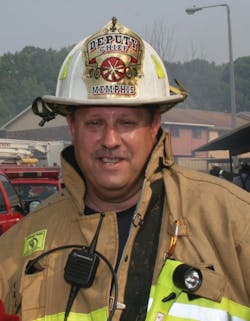EMS: 10 Years!
Ten years later! It is amazing how fast 10 years goes by and at the same time it is amazing how much has changed in 10 years since the terrorist attacks in New York City and at the Pentagon and the downing of the jetliner in Shanksville, PA.
Watching the video coverage 10 years later and hearing the recollections of that day conjures up many memories, thoughts and emotions for which there are no words. Try talking to some of those who fought that desperate battle that day – there are no gestures or words to match any memorial service.
The 10th anniversary of the 9/11 attacks on America is a time for remembrance, to honor those who died and hopefully bring some healing. I think we all can remember where we were when we heard the news and saw the first images on TV. Some reading this column even witnessed these tragic events first-hand. What is amazing to me is how much can change in 10 years.
One of the biggest changes I have seen is the way firefighters are viewed. Ten years ago, the public gained a new appreciation for firefighters and a new perspective for the dangerous work that comes with firefighting, rescue and EMS. Unfortunately, it took 343 members of the FDNY to bring about that realization. Citizens who were grateful for the work performed by firefighters came with cookies, cakes and other gifts to firehouses. They showed their appreciation and said thank you for the work we perform.
But 10 years later, firefighters are under attack because some believe we are paid too much and pension systems are bloated. Reports continue to stream in of politicians attacking firefighters in open meetings. Talking heads on Fox News, CNN, MSNBC, and newspapers in some communities blame firefighters and other civil servants for holding the economy back from recovering and point to firefighters as earning high paychecks. Some newspapers run stories on a firefighter’s salary or overtime. One TV station investigative report attacked a firefighter applying for a disability pension as a result of a job-related injury that rendered him unable to perform as a firefighter. The headline: “This Man Wants You to Give Him a Check the Rest of His Life.” Never mind that he is no longer able to work because he was protecting the community when he was injured and never mind that 8% of each paycheck was deducted because he paid into the pension system.
Interestingly, while firefighters are being attacked, big shots on Wall Street continue to earn record salaries, commissions and bonuses. I don’t begrudge them for earning big pay, but let’s be honest – our economic troubles came from those on Wall Street who created a housing bubble with predator lending and when that bubble burst, our economy slid backwards.
What else has changed in the past 10 years?
Many fire responders to the 9/11 attacks have been stricken with cancers and other diseases. Hundreds of deaths among 9/11 rescue workers from lymphoma, multiple myeloma, leukemia, cancers of the esophagus, stomach, lung, larynx, liver, colon, pancreas and brain have been reported.
Physicians at The Mount Sinai Medical Center in New York City published a study titled “Multiple Myeloma in World Trade Center Responders: A Case Series” in the August 2009 Journal of Occupational and Environmental Medicine that found an “unusual number” of multiple myeloma, or bone marrow cancer, cases in World Trade Center responders under age 45 (http://journals.lww.com/joem/Fulltext/2009/08000/Multiple_Myeloma_in_World_Trade_Center_Responders_.7.aspx). But cancer-stricken firefighters and others who responded to the 9/11 attacks on the World Trade Center do not qualify for federal aid, according to a review by the National Institute for Occupational Safety and Health (NIOSH), which concluded that “insufficient evidence exists at this time to propose a rule to add cancer, or a certain type of cancer,” to the list of diseases that qualify for aid under the James Zadroga 9/11 Health and Compensation Act.
What else has changed in the past 10 years? Millions of dollars have been allocated to fire departments and EMS agencies from Urban Areas Security Initiative (USAI), Metropolitan Medical Response System (MMRS) and Assistance to Firefighters Grant (AFG) Program grants. Are those fire departments and EMS agencies really prepared to handle another terrorist attack of the magnitude or greater of what we saw on 9/11?
If another Hurricane Katrina came ashore or if a massive earthquake were to occur causing damage through several states, could the Federal Emergency Management Agency (FEMA) rapidly pull fire and EMS resources from any state? Do those states have mutual aid systems in place under which they could rapidly marshal resources and send them based on a FEMA request? Only a few states that I know of are organized to that level.
On the bright side, I believe that grants programs have helped fire departments and EMS systems to not only respond to cataclysmic events, but to daily events in their communities. I believe we still have a long way to go, but at least we are heading in the right direction. Unfortunately, fire departments and EMS agencies should not expect too much help from the federal government in the future as Congress looks for ways to reduce the federal deficit. It will be interesting to see how things look on the 20th anniversary of 9/11.
